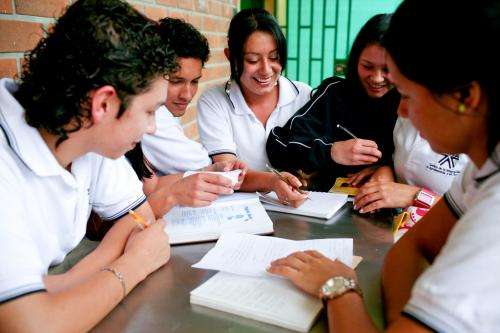Primary to secondary school transition scrutinised

Poorer school students and those with a disability require additional support to successfully manage the transition from primary to secondary school, according to a longitudinal study by Curtin University.
Researchers from the Curtin Health Innovation Research Institute investigated the impact that personal background and school contextual factors had on the academic competence and mental wellbeing of students during the changeover.
Personal background factors include the participant's gender, presence of disability and household socio-economic standing while school contextual factors include size, sector organisational model, and mean socio-economic standing.
The scientists collected data from 266 students from 75 different schools in WA's metropolitan and regional areas via questionnaires in the six months before and after the students transitioned to secondary school.
The students (197 were considered typically developing while 69 students had a disability) were analysed using hierarchical linear regression modelling.
Curtin Post-Doctoral Research Fellow Sharmila Vaz says the study found personal background factors explained most of the variability in students' academic competence and mental health functioning, before and after the transition.
However, they determined that the impact of those personal background factors on the students' academic competence lessened significantly subsequent to the transition.
This was despite their academic competence scores staying the same over an extended period of time.
Ms Vaz says the fact that students' scores remained constant over time means factors other than personal background factors (gender, disability and household-socio-economic standing) influence their post-transition academic competence.
She also says the consistently lower academic competence in the disability sub-group highlights the need for schools to recognise and address this issue.
"Of interest was an improvement in the disability subgroup's academic competence after the transition," she says.
The researchers also determined that no secondary school contextual characteristic (their size or organisational model) impacted on the students' academic performance and mental health functioning.
"This means that individual student factors and primary school contextual factors are more important contributors of post-transition adjustment than concurrent secondary school contextual factors," Ms Vaz says.
"Thus, there exists a greater responsibility on primary schools to ensure that the transition needs of the disadvantaged groups are satisfactorily met."
They also determined that students from schools which had a Kindergarten – Year 12 structure with a middle school had reduced academic competency scores across the transition compared to students from schools that lacked a middle school component.
More information: Vaz S, Parsons R, Falkmer T, Passmore AE, Falkmer M (2014) "The Impact of Personal Background and School Contextual Factors on Academic Competence and Mental Health Functioning across the Primary-Secondary School Transition." PLoS ONE 9(3): e89874. DOI: 10.1371/journal.pone.0089874
Journal information: PLoS ONE
Provided by Science Network WA


















